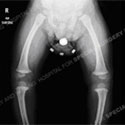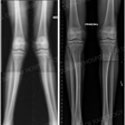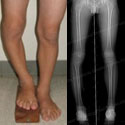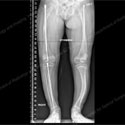
Pediatric Limb Deformity / Length Discrepancy
In growing children, limb deformities of the legs, including bowlegs (genu varum) and knock knees (genu valgum) are among the most frequent causes for a visit to the pediatric orthopedist. In many cases the alignment of the legs corrects naturally. However, in those cases where the condition persists or the abnormality becomes more pronounced, medical attention is required.
Children who are born with or who develop differences in the length of their limbs can benefit from a range of treatments that may be as simple as the use of adaptive footwear or as sophisticated as limb lengthening surgical intervention that helps generate new bone in the affected limb. When limb lengthening surgery is indicated, orthopedic surgeons can safely and gradually lengthen the affected bone by up to 15 to 20 centimeters.
For more information on pediatric limb deformity and length discrepancy, please refer to the following articles:

Bowleg deformity is a condition in which a standing child, toes and feet pointed forward, has knees that remain wide apart.

Knock knees is a condition in which a standing child with toes pointed forward and knees that touch while feet and ankles remain wide apart.

Because the growth plate is the area where new bone develops (adding length to the bone), injury to this area can result in growth arrest and subsequent limb length discrepancy, in which one leg is longer than the other.

Although upper extremity bones such as the humerus (the bone that connects the elbow and shoulder joints) may be affected, limb length disparity is more typical in the lower extremity, particularly in the femur, the long bone in the leg extending from the hip to the knee joint.
Learn more about limb length discrepancies and corrective surgery

